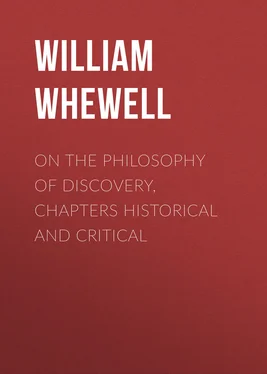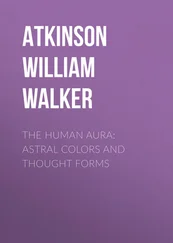William Whewell - On the Philosophy of Discovery, Chapters Historical and Critical
Здесь есть возможность читать онлайн «William Whewell - On the Philosophy of Discovery, Chapters Historical and Critical» — ознакомительный отрывок электронной книги совершенно бесплатно, а после прочтения отрывка купить полную версию. В некоторых случаях можно слушать аудио, скачать через торрент в формате fb2 и присутствует краткое содержание. Жанр: foreign_prose, foreign_religion, Философия, foreign_psychology, foreign_antique, на английском языке. Описание произведения, (предисловие) а так же отзывы посетителей доступны на портале библиотеки ЛибКат.
- Название:On the Philosophy of Discovery, Chapters Historical and Critical
- Автор:
- Жанр:
- Год:неизвестен
- ISBN:нет данных
- Рейтинг книги:5 / 5. Голосов: 1
-
Избранное:Добавить в избранное
- Отзывы:
-
Ваша оценка:
- 100
- 1
- 2
- 3
- 4
- 5
On the Philosophy of Discovery, Chapters Historical and Critical: краткое содержание, описание и аннотация
Предлагаем к чтению аннотацию, описание, краткое содержание или предисловие (зависит от того, что написал сам автор книги «On the Philosophy of Discovery, Chapters Historical and Critical»). Если вы не нашли необходимую информацию о книге — напишите в комментариях, мы постараемся отыскать её.
On the Philosophy of Discovery, Chapters Historical and Critical — читать онлайн ознакомительный отрывок
Ниже представлен текст книги, разбитый по страницам. Система сохранения места последней прочитанной страницы, позволяет с удобством читать онлайн бесплатно книгу «On the Philosophy of Discovery, Chapters Historical and Critical», без необходимости каждый раз заново искать на чём Вы остановились. Поставьте закладку, и сможете в любой момент перейти на страницу, на которой закончили чтение.
Интервал:
Закладка:
In the Metaphysics 28 28 xii. 8.
he enumerates the circular movements which had been introduced by the astronomers Eudoxus and Calippus for the explanation of the phenomena presented by the sun, moon and planets. These, he says, amount to fifty-five; and this, he says, must be the number of essences and principles which exist in the universe.
7. In the Sciences of Classification, and especially in the classification of animals, higher claims have been made for Aristotle, which I have discussed in the History 29 29 B. xvi. c. vi.
. I have there attempted to show that Aristotle's classification, inasmuch as it enumerates all the parts of animals, may be said to contain the materials of every subsequent classification: but that it cannot be said to anticipate any modern system, because the different grades of classification are not made subordinate to one another as a system of classification requires. I have the satisfaction of finding Mr. Owen agreeing with me in these views 30 30 On the Classification of Mammalia, &c.: a Lecture delivered at Cambridge , May 10, 1859, p. 3.
.
8. Francis Bacon's criticism on Aristotle which I have quoted in the Appendix to the History 31 31 B. i. c. xi.
, is severe, and I think evidently the result of prejudice. He disparages Aristotle in comparison with the other philosophers of Greece. 'Their systems,' he says, 'had some savour of experience, and nature, and bodily things; while the Physics of Aristotle, in general, sound only of Logical Terms.
'Nor let anyone be moved by this: that in his books Of Animals , and in his Problems , and in others of his tracts, there is often a quoting of experiments. For he had made up his mind beforehand; and did not consult experience in order to make right propositions and axioms, but when he had settled his system to his will, he twisted experience round and made her bend to his system.'
I do not think that this can be said with any truth. I know no instances in which Aristotle has twisted experience round, and made her bend to his system. In his Problems , he is so far from giving dogmatical solutions of the questions proposed, that in most cases, he propounds two or three solutions as mere suggestions and conjectures. And both in his History of Animals, as I have said, and in others of his works, the want of system gives them an incoherent and tumultuary character, which even a false system would have advantageously removed; for, as I have said elsewhere, it is easier to translate a false system into a true one, than to introduce system into a mass of confusion.
9. It is curious that a fundamental error into which Aristotle fell in his view of the conditions which determine the formation of Science is very nearly the same as one of Francis Bacon's leading mistakes. Aristotle says, that Science consists in knowing the causes of things, as Bacon aims at acquiring a knowledge of the forms or essences of things and their qualities. But the history of all the sciences teaches us that sciences do not begin with such knowledge, and that in few cases only do they ever attain to it. Sciences begin by a knowledge of the laws of phenomena , and proceed by the discovery of the scientific ideas by which the phenomena are colligated, as I have shown in other works 32 32 History of Scientific Ideas , and Novum Organum Renovatum .
. The discovery of causes is not beyond the human powers, as some have taught. Those who thus speak disregard the lessons taught by the history of Physical Astronomy, of Geology, of Physical Optics, Thermotics and other sciences. But the discovery of causes, and of the essential forms of qualities, is a triumph reserved for the later stages of each Science, when the knowledge of the laws of phenomena has already made great progress. It was not to be expected that Aristotle would discern this truth, when, as yet, there was no Science extant in which it had been exemplified. Yet in Astronomy, the theory of epicycles and excentrics had immense value, and even has still, as representing the laws of phenomena; while the attempt to find in it, as Aristotle wished to do, the ultimate causes of the motions of the universe, could only mislead. The Aristotelian maxim, which sounds so plausible, and has been so generally accepted, that "to know truly is to know the causes of things," is a bad guide in scientific research. Instead of it we might substitute this: that "though we may aspire to know at last why things are, we must be content for a long time with knowing how they are."
10. Hence if we are asked whether Plato or Aristotle had the truer views of the nature and property of Science, we must give the preference to Plato; for though his notion of a real Intelligible World, of which the Visible world was a fleeting and changeable shadow, was extravagant, yet it led him to seek to determine the forms of the Intelligible Things, which are really the laws of visible phenomena; while Aristotle was led to pass lightly over such laws, because they did not at once reveal the causes which produced the phenomena.
11. Aristotle, throughout his works, takes numerous occasions to argue against Plato's doctrine of Ideas. Yet these Ideas, so far as they were the Intelligible Forms of Visible Things, were really fit objects of philosophical research; and the search after them had a powerful influence in promoting the progress of Science. And we may see in the effect of this search the answer to many of Aristotle's strongest arguments. For instance, Aristotle says that Plato, by way of explaining things, adds to them as many Ideas, and that this is just as if a man having to reckon a large number, were to begin by adding to it another large number. It is plain that to this we may reply, that the adopting the Ideas of Cycles, along with the motions of the Planets, does really explain the motions; and that the Cycles are not simply added to the phenomena, but include and supersede the phenomena: a finite number of Cycles include and represent an infinite number of separate phenomena.
To Aristotle's argument that Ideas cannot be the Causes or Principles of Things, we should reply, that though they cannot be this, they may nevertheless be, and must be, the Conditions and Principles of our Knowledge, which is what we want them to be.
I have given an account of the main features of Aristotle's philosophy, so far as it concerns the Physical Sciences, in the History of the Inductive Sciences, Book I.
CHAPTER VI.
The Later Greeks
Thus while Plato was disposed to seek the essence of our knowledge in Ideas alone, Aristotle, slighting this source of truth, looked to Experience as the beginning of Science; and he attempted to obtain, by division and deduction, all that Experience did not immediately supply. And thus, with these two great names, began that struggle of opposite opinions which has ever since that time agitated the speculative world, as men have urged the claims of Ideas or of Experience to our respect, and as alternately each of these elements of knowledge has been elevated above its due place, while the other has been unduly depressed. We shall see the successive turns of this balanced struggle in the remaining portions of this review.
But we may observe that practically the influence of Plato predominated rather than that of Aristotle, in the remaining part of the history of ancient philosophy. It was, indeed, an habitual subject of dispute among men of letters, whether the sources of true knowledge are to be found in the Senses or in the Mind; the Epicureans taking one side of this alternative, and the Academics another, while the Stoics in a certain manner included both elements in their view. But none of these sects showed their persuasion that the materials of knowledge were to be found in the domain of Sense, by seeking them there. No one appears to have thought of following the example of Aristotle, and gathering together a store of observed facts. We may except, perhaps, assertions belonging to some provinces of Natural History, which were collected by various writers: but in these, the mixed character of the statements, the want of discrimination in the estimate of evidence, the credulity and love of the marvellous which the authors for the most part displayed, showed that instead of improving upon the example of Aristotle, they were wandering further and further from the path of real knowledge. And while they thus collected, with so little judgment, such statements as offered themselves, it hardly appears to have occurred to any one to enlarge the stores of observation by the aid of experiment; and to learn what the laws of nature were, by trying what were their results in particular cases. They used no instruments for obtaining an insight into the constitution of the universe, except logical distinctions and discussions; and proceeded as if the phenomena familiar to their predecessors must contain all that was needed as a basis for natural philosophy. By thus contenting themselves with the facts which the earlier philosophers had contemplated, they were led also to confine themselves to the ideas which those philosophers had put forth. For all the most remarkable alternatives of hypothesis, so far as they could be constructed with a slight and common knowledge of phenomena, had been promulgated by the acute and profound thinkers who gave the first impulse to philosophy: and it was not given to man to add much to the original inventions of their minds till he had undergone anew a long discipline of observation, and of thought employed upon observation. Thus the later authors of the Greek Schools became little better than commentators on the earlier; and the commonplaces with which the different schools carried on their debates,—the constantly recurring argument, with its known attendant answer,—the distinctions drawn finer and finer and leading to nothing,—render the speculations of those times a scholastic philosophy, in the same sense in which we employ the term when we speak of the labours of the middle ages. It will be understood that I now refer to that which is here my subject, the opinions concerning our knowledge of nature, and the methods in use for the purpose of obtaining such knowledge. Whether the moral speculations of the ancient world were of the same stationary kind, going their round in a limited circle, like their metaphysics and physics, must be considered on some other occasion. 33 33 The remainder of this chapter is new in the present edition.
Интервал:
Закладка:
Похожие книги на «On the Philosophy of Discovery, Chapters Historical and Critical»
Представляем Вашему вниманию похожие книги на «On the Philosophy of Discovery, Chapters Historical and Critical» списком для выбора. Мы отобрали схожую по названию и смыслу литературу в надежде предоставить читателям больше вариантов отыскать новые, интересные, ещё непрочитанные произведения.
Обсуждение, отзывы о книге «On the Philosophy of Discovery, Chapters Historical and Critical» и просто собственные мнения читателей. Оставьте ваши комментарии, напишите, что Вы думаете о произведении, его смысле или главных героях. Укажите что конкретно понравилось, а что нет, и почему Вы так считаете.












